
"I'll Be There" is the first single released from Third Album by The Jackson 5. It was written by Berry Gordy, Hal Davis, Bob West, and Willie Hutch.

"Heartbreaker" is a song by American singer-songwriter Mariah Carey featuring American rapper Jay-Z for her seventh studio album Rainbow (1999). It was released on August 23, 1999, by Columbia Records as the lead single from Rainbow. The song was written by the artists and produced by Carey and DJ Clue, with additional writers being credited for the hook being built around a sample from "Attack of the Name Game" by Stacy Lattisaw. "Heartbreaker" pushed Carey even further into the R&B and hip hop market, becoming her second commercial single to feature a rapper. Lyrically, the song describes lovesickness towards an unfaithful partner.

"Forever" is a song recorded by American singer-songwriter, and record producer Mariah Carey for her fifth studio album, Daydream (1995). It was released by Columbia Records on June 18, 1996, as an airplay-only single and the fifth single from the album. The song was written and produced by Carey and Walter Afanasieff, and was composed throughout 1995. Its lyrics describe a situation where the protagonist knows her relationship with her lover has withered away, however he will continue living in her memory forever.

"I Know What You Want" is a song by American rapper Busta Rhymes and singer Mariah Carey, featuring verses from Rhymes' group Flipmode Squad: Spliff Star, Baby Sham, Rah Digga, and Rampage. Produced by Rick Rock, it was released on February 24, 2003 as the second single from Rhymes' sixth album It Ain't Safe No More..., released on November 26, 2002.

American singer Mariah Carey has released 88 official singles, 22 promotional singles, and has made 30 guest appearances. Her self-titled debut album in 1990 yielded four number-one singles on the Billboard Hot 100, the first being "Vision of Love", a song credited with revolutionizing the usage of distinguished vocal stylings, predominantly the practice of melisma, and effectively influencing virtually every female R&B performer since the 1990s. Subsequent singles "Emotions" (1991) and Carey's cover of the Jackson 5 track, "I'll Be There" (1992) continued the singer's streak of US number-one singles, with the latter becoming her fourth chart-topper in Canada and first in the Netherlands. With the release of Carey's third studio album, Music Box (1993), the singer's international popularity surged upon release of "Hero" and the album's third single, her cover of Harry Nilsson's "Without You", which became the singer's first number-one single in several countries across Europe.

"All I Want for Christmas Is You" is a song by American singer Mariah Carey from her fourth studio album and first holiday album, Merry Christmas (1994). Written and produced by Carey and Walter Afanasieff, the song was released as the lead single from the album on October 29, 1994, by Columbia Records. The track is an uptempo love song that includes bell chimes, backing vocals, and synthesizers. It has received critical acclaim, with The New Yorker describing it as "one of the few worthy modern additions to the holiday canon". The song has become a Christmas standard, with a significant rise in popularity every December.

"Anytime You Need a Friend" is a song by American singer and songwriter Mariah Carey. The song was written and produced by Carey and Walter Afanasieff, for her third studio album, Music Box (1993). It was released on May 24, 1994, through Columbia Records, as the fifth and final single from the album. The song is influenced by pop, R&B and gospel genres. While the album focused heavily on pop oriented and radio friendly material, "Anytime You Need a Friend" deviated from the formula, finishing as the only gospel-infused song on Music Box. Lyrically, the song's protagonist tells her love interest that anytime he may need a friend, she will be there unconditionally for him. Throughout the song's bridge and climax, critics noted the lyrics altering from those of a friend, to those of a lover.
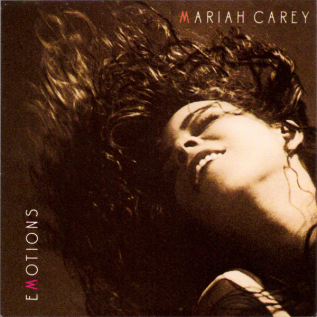
"Emotions" is a song recorded by American singer-songwriter Mariah Carey for her second studio album of the same name (1991). It was written and produced by Carey, Robert Clivillés, and David Cole of C+C Music Factory and released as the album's lead single on August 13, 1991 by Columbia Records. The song's lyrics has its protagonist going through a variety of emotions from high to low, up to the point where she declares, "You got me feeling emotions." Musically, it is a gospel and R&B song heavily influenced by 1970s disco music and showcases Carey's upper range and extensive use of the whistle register. Jeff Preiss directed the song's music video.

"Love Takes Time" is a song recorded by American singer Mariah Carey for her eponymous debut studio album (1990). Written by Carey and Ben Margulies, while produced by Walter Afanasieff, the song was released as the second single from the album on August 22, 1990, by Columbia Records. An adult contemporary-influenced ballad, the song follows its protagonist lamenting the loss of a lover and confesses that "love takes time" to heal and that her feelings for her ex-lover remain.
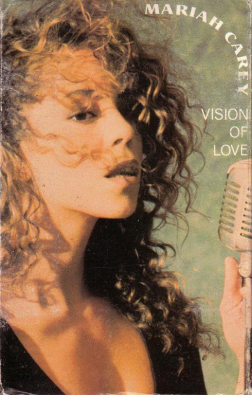
"Vision of Love" is the debut single by American singer-songwriter Mariah Carey, recorded for her eponymous debut studio album (1990). It was written by Carey and Ben Margulies. After being featured on Carey's demo tape for Columbia Records, the song was re-recorded and produced by Rhett Lawrence and Narada Michael Walden. The song features a slow-dance theme tempo and backing vocals sung by Carey, and introduces her usage of the whistle register. The lyrics of the song represent her past life filled with "alienation" and how she had dreamed of achieving her triumph over adversity up to the moment when it finally came to fruition as the "vision of love" that she had always believed in, despite everything that she has had to deal with in life. The song was released as the lead single from Mariah Carey on May 15, 1990, by Columbia Records.

"Dreamlover" is a song recorded by American singer-songwriter and record producer Mariah Carey, released on July 27, 1993 by Columbia Records, as the lead single from the singer's third studio album, Music Box (1993). Its lyrics were written by Carey, with music composed by Carey and Dave Hall, and was produced by Carey, Walter Afanasieff and Hall. The song incorporates a sample of the hook from "Blind Alley" by the Emotions—previously used in "Ain't No Half-Steppin'" (1988) by Big Daddy Kane—into its melody and instrumentation. "Dreamlover" marked a more pronounced attempt on Carey's part to incorporate hip hop into her music, as was seen in her decision to work with Hall, who had previously produced What's the 411? (1992) by Mary J. Blige. This was partly in light of the mixed reception to her previous studio effort Emotions (1991), which featured gospel and 1960s soul influences. Lyrically, the song pictures a protagonist calling for a perfect lover, her "dreamlover," to whisk her away into the night and not "disillusion" her like others in the past.

"My All" is a song by American singer-songwriter Mariah Carey from her sixth studio album, Butterfly (1997). It was released as the album's fifth single overall and second commercial single on April 21, 1998, by Columbia Records. The song was written and produced by Carey and Walter Afanasieff. "My All" is built around Latin guitar chord melodies, and makes subtle use of Latin percussion throughout the first chorus, before taking on a more conventional R&B-style beat. Carey was inspired to write the song and use Latin inspired melodies after a trip to Puerto Rico, where she was influenced by the culture. The song's lyrics tell of a lonely woman declaring she would give "her all" to have just one more night with her estranged lover. It is the first song Carey wrote for the Butterfly album.

"Hero" is a song by American singer-songwriter, and record producer Mariah Carey released on October 18, 1993, via Columbia Records as the second single from her third studio album, Music Box (1993). The song was written and produced by Carey and Walter Afanasieff. While writing the song, Carey did not connect to its style or sound, therefore forfeiting it to Gloria Estefan, who was intended to sing it for the soundtrack of the film of the same name (1992). However, after being convinced by Sony executive Tommy Mottola to keep it for herself, she changed some of the lyrics to more precisely fit her personality. Lyrically, the song is regarded as one of Carey's most inspirational and personal ballads, with its protagonist declaring that even though people may feel discouraged or down at times, in reality, they are "heroes" if they look inside themselves and see their own inner strength; in time, it will help them "find the way".

"Fantasy" is a song by the American singer-songwriter Mariah Carey. It was released on August 23, 1995, by Columbia Records as the lead single from her fifth album, Daydream (1995). The track was written and produced by Carey and Dave Hall. It samples Tom Tom Club's 1981 song "Genius of Love". The lyrics describe a woman who is in love with a man, and how every time she sees him she starts fantasizing about an impossible relationship with him. The remix for the song features rap verses from Ol' Dirty Bastard, something Carey arranged to assist in her crossover into the hip-hop market and credited for introducing R&B and hip hop collaboration into mainstream pop culture, and for popularizing rap as a featuring act.
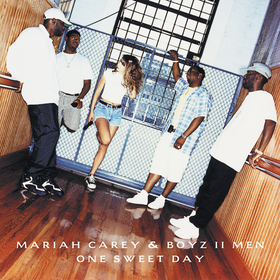
"One Sweet Day" is a song by American singer-songwriter Mariah Carey and American vocal group Boyz II Men. The song was released on November 14, 1995, as the second single from the former's fifth studio album, Daydream (1995) by Columbia Records. The artists co-wrote the song with Walter Afanasieff, who co-produced it with Carey. Lyrically, the song speaks about the death of a loved one, how the protagonist took their presence for granted and misses them, and finally about seeing the person in heaven. The artists wrote the song about specific people in their lives, being inspired by sufferers of the AIDS epidemic, which was globally prevalent at the time.

"Always Be My Baby" is a song recorded by American singer-songwriter, and record producer Mariah Carey for her fifth studio album, Daydream (1995). It was released by Columbia Records on February 20, 1996, as the third single in the United States and fourth worldwide. Written and produced by Carey, Jermaine Dupri and Manuel Seal, "Always Be My Baby" is a midtempo song, with lyrics describing the feeling of attachment and unity the singer feels towards her estranged lover, even though they are no longer together, she says he will always be a part of her and will "always be her baby" even after they move on.

Music Box is the third studio album by American singer-songwriter Mariah Carey. It was released by Columbia Records on August 31, 1993. The album comprises ballads primarily written by Carey and Walter Afanasieff, with whom she had previously worked on Emotions (1991), and a few urban dance tracks. During the course of the album's development, Carey wanted to broaden her audience, choosing a more pop/R&B oriented sound. During this time frame, she experimented with different musical instruments, leading the album's sound away from her more contemporary previous two efforts.
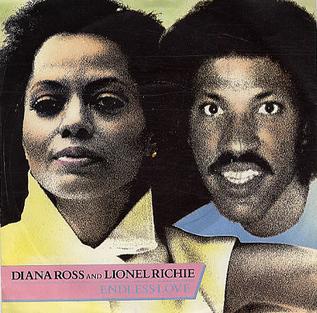
"Endless Love" is a song written by Lionel Richie and originally recorded as a duet between Richie and singer/actress Diana Ross. In this ballad, the singers declare their "endless love" for one another. It was covered by Luther Vandross with R&B-pop singer Mariah Carey, and also by country music singer Shania Twain. Richie's friend Kenny Rogers also recorded the song. Billboard has named the original version as the greatest song duet of all time.
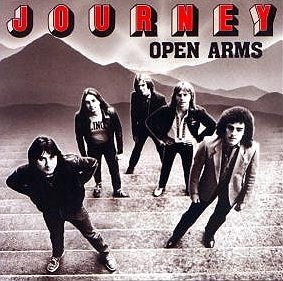
"Open Arms" is a song by American rock band Journey. It was released as a single from the Heavy Metal soundtrack and their 1981 album, Escape. Co-written by band members Steve Perry and Jonathan Cain, the song is a power ballad whose lyrics attempt to renew a drifting relationship. It is one of the band's most recognizable radio hits and their biggest US Billboard Hot 100 hit, reaching number two in February 1982 and holding that position for six weeks.

"I Still Believe" is a song written and composed by Antonina Armato and Giuseppe Cantarelli, and originally recorded by pop singer Brenda K. Starr for her eponymous second studio album, Brenda K. Starr (1987). It is a ballad in which the singer is confident she and her former boyfriend will be together again one day. It is Starr's biggest hit in the United States, reaching the top-twenty on the Billboard Hot 100 and being considered her signature song. "I Still Believe" was covered by American singer Mariah Carey, a former backup singer for Starr before she achieved success, for her #1's album in 1998 and released as a single in 1999. It was also recorded by Cantopop singer Sandy Lam in 1989.



















